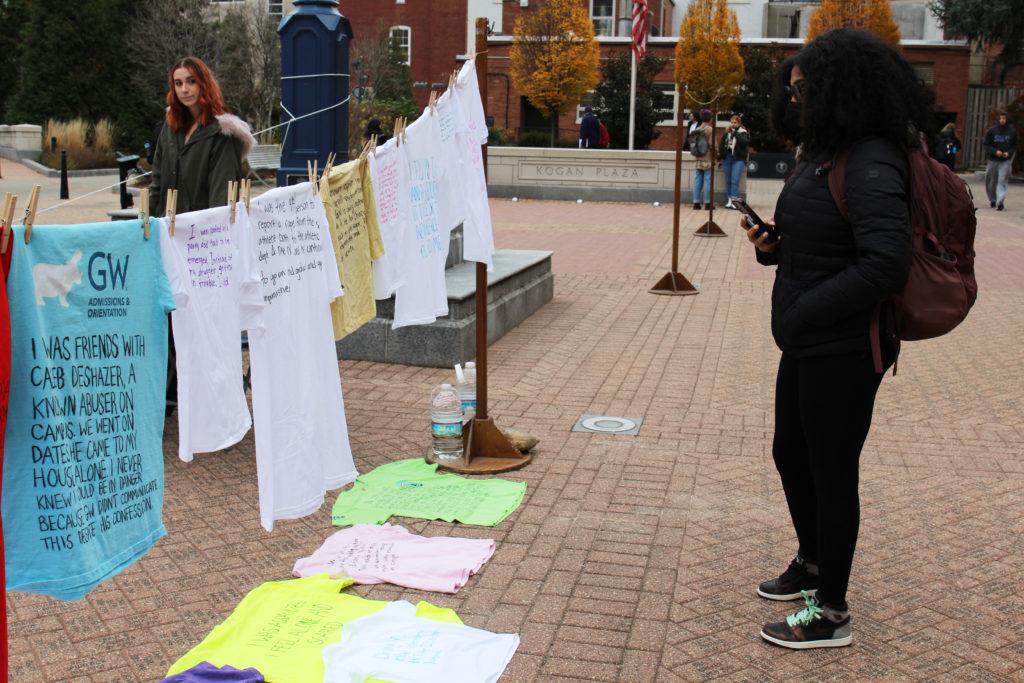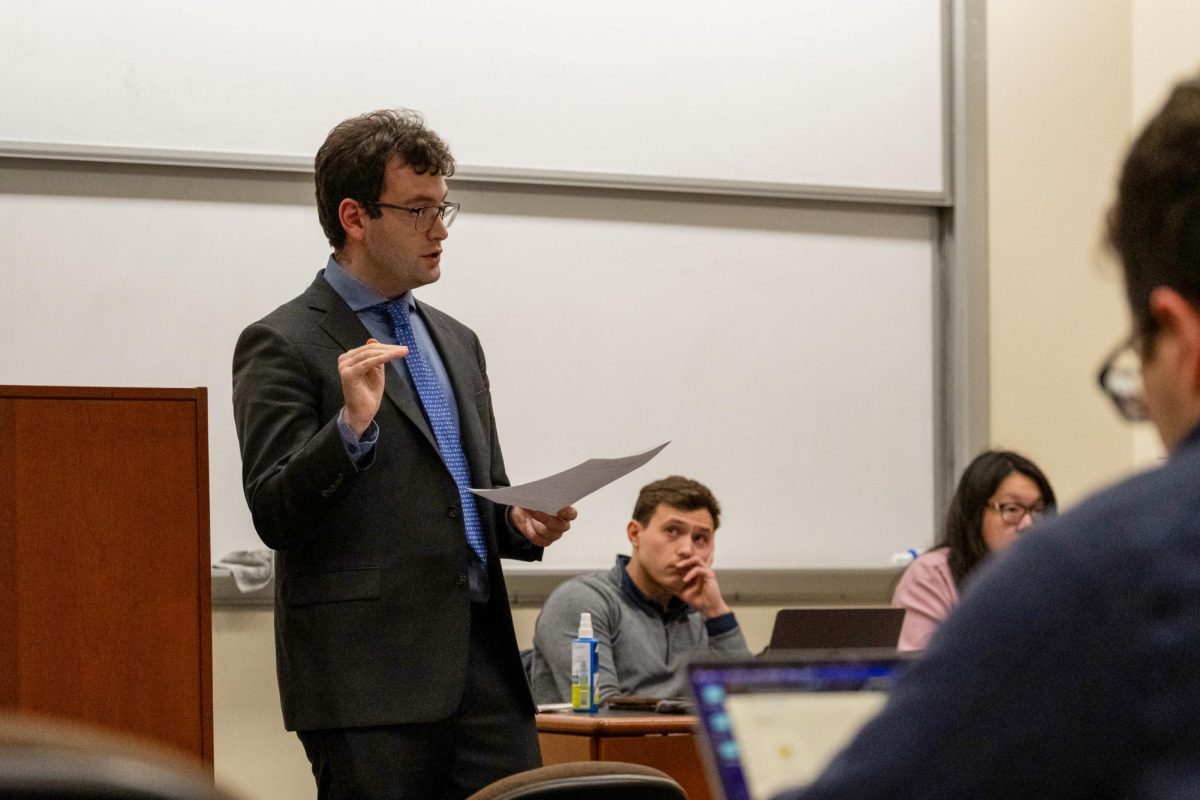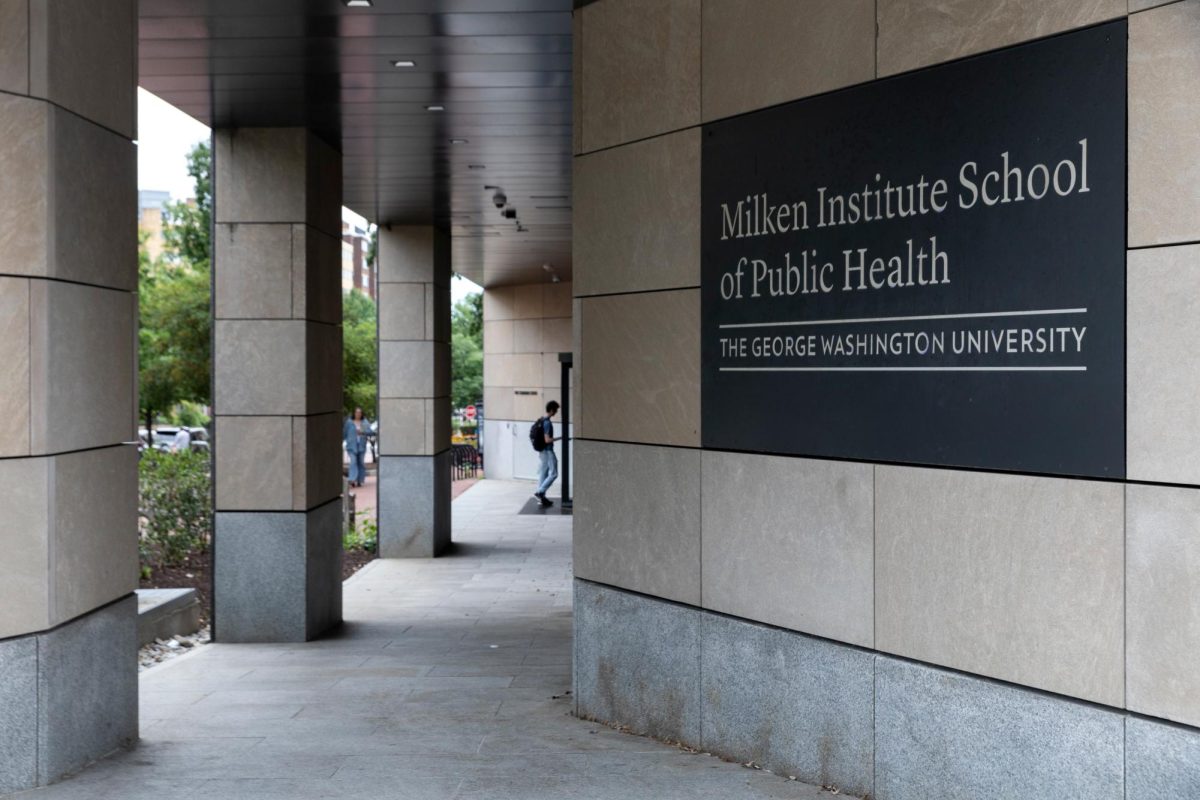Students hung t-shirts bearing stories of sexual assault survivors in Kogan Plaza Wednesday to raise awareness about recent concerns with the Title IX Office.
The protesters hung 64 shirts with stories about sexual assault survivors’ experiences with the Title IX Office in the center of Kogan, lining either side of a sign that read “GW Protects Rapists.” Organizers said they hope the demonstration, called the Clothesline Project, educated students about their concerns with the Title IX office and pushed them to take action to support sexual assault survivors on campus.
Shira Strongin, a senior and a co-president of Students Against Sexual Assault who oversaw the demonstration, said the Clothesline Project gave students the opportunity to participate in a “safe manner” and visit for as long as they were comfortable.
“So if they are triggered and don’t want to read it and walk by, they’re able to,” she said. “If they are interested, they’re able to. It’s a tangible form of action.”
Members of SASA were in Kogan throughout the day to help write survivors stories on the shirts so they could remain anonymous.
She said organizers chose to hold the demonstration in Kogan because the area gets the most foot traffic from students walking to and from classes. She said campus tours passing through Kogan also stopped to learn about the demonstration.
She said she hopes parents and potential students on tours learning about survivors’ concerns with the Title IX Office will prompt the University to fulfill the changes they promised in their recent release late last month. Officials said in the release that they will enhance training for students, faculty and staff after appointing a training supervisor in the GW Police Department to engage with SASA and the Office of Advocacy and Support.
“It’s kind of the middle of the last week of classes, middle of finals, which means that students are moving through here a lot,” she said. “And there are tours that are happening, which I think is really to our benefit as far as getting GW to listen.”
The Clothesline Project model has been used across the country to raise awareness about domestic abuse and sexual assault, originating in Massachusetts in 1990 with the goal of highlighting previously ignored acts of violence like domestic abuse and sexual assault. The first project was in response to the fact that 51,000 women were killed by domestic and sexual abusers while 58,000 soldiers died in the Vietnam War at the same time.
GW Protects Rapists posted on Instagram Nov. 5 that survivors could submit their stories about “feeling unsafe” at GW through a Google Form to be written on a shirt for the demonstration. Other stories included those where GWPD did not protect students, GW administration and policies put students “in harm’s way” or when students felt scared to report because they knew they would not be heard.
“From repeated hate crimes against the Jewish community to leaving out crucial information in GWPD alerts about a sexual assaulter that hasn’t been caught to not doing anything when dozens of students call in to report a man who has been sexually harassing and stalking women on campus for weeks, there is an inherent problem that the GW administration continues failing to address,” the post states. “We are left to protect ourselves when that should never be our responsibility as students.”
The post outlines the University’s “failure to protect students” including incidents on campus like recent hate crimes against Jewish students, like the desecration of a Torah in the Tau Kappa Epsilon townhouse.
The post also mentions concerns with the University’s communication about an assault with intent to commit sexual abuse on campus earlier this semester. After an unknown suspect wounded a staff member the Metropolitan Police Department declared that the suspect assaulted the staff member with an “intent to commit first-degree sexual abuse,” but 40 minutes later, University officials sent an email to the GW community about the crime without any mention of potential sexual abuse.
She said she hopes students who attended the demonstration were prompted to take action after reading the survivors’ story.
“I hope they become more aware of the issues going around on campus and hopefully get involved,” she said. “Whether that means holding administration accountable, joining orgs, like GW SASA, or just simply helping to be a leader in creating a shift in campus culture.”
She said one story told of a survivor who experienced a Title IX coordinator “laughing” at their disclosure.
“That’s just unacceptable, horrific, negligent, just so many different things that I can’t even begin to express how awful that is,” she said.
She said the demonstration was a “personal” experience and the sharing of survivors’ stories was both extremely powerful and painful. She said she watched students throughout the day recognize issues on campus and want to take action.
“It’s painful to watch them,” she said. “It’s painful to hear that kind of, ‘Oh, my god’ moment that a lot of students have had. But it’s also powerful because you can see the shift happening, you can see them wanting to get involved. We’ve had a lot of conversations to be like, ‘How can I help?”’








